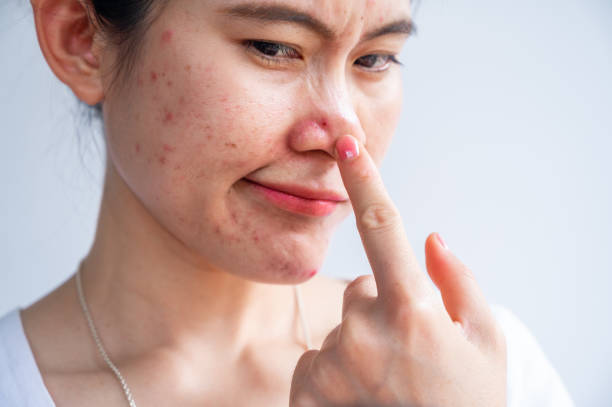Do you know why we get pimples? Let’s talk about it! Things like certain foods, hormones, stress, and skincare stuff can trigger acne breakouts. Knowing these reasons helps us have better skin. Let’s learn more about acne and skin conditions. We’ll cover breakouts, health info, and home remedies to fix it. Get ready to have nice skin and no more pimples, consult a dermatologist!


Key Takeaways
- Maintain a Consistent Skincare Routine. Wash your face with a gentle cleanser. Use products that won’t clog pores to stop pimples and prevent acne.
- Identify Triggers. Look out for things like what you eat, stress, and hormones. They can make breakouts worse in this skin condition.
- Consult a Dermatologist. If you have bad acne, breakouts, scarring, or the like, see a skin doctor for the right treatment.
- Healthy Lifestyle Habits are simple. Eat healthy food, exercise, and manage stress. Doing this will keep your skin healthy.
- Be Patient with Treatment: Treating acne takes time. Use your meds and skincare routine every day for the best results.
- Stay Positive: Although common, you can manage acne for beautiful skin.
THINGS TO CONSIDER
Did you know stress can make acne worse? When we feel stressed, our bodies make cortisol, a hormone that can make more oil on our skin and cause pimples.
Understanding Acne
Who Does Acne Affect?
Acne can happen to anyone, not just teenagers. Adults can get pimples too for several reasons.
When you grow up, your body changes. It produces more sebum from oil glands, which can cause acne. Feeling stressed, having a family history, or acne can also make you more likely to get skin breakouts.
Common Locations for Acne on the Body
From our experiences, we found that most acne happens on the face and skin surface. They show up on the forehead, nose, and chin. They are pores that have whiteheads, blackheads, or other eruptions.
Acne is a skin condition. It can appear on your back, chest, and shoulders. These spots have many oil glands that cause breakouts.
Symptoms and Triggers
Common Signs
Acne is a skin condition. It causes redness, inflammation, and cysts. These lead to swollen pimples on your face, neck, chest, shoulders, and back. It can hurt sometimes.
Hormonal Changes
Hormones can change your body, like during puberty or your period. They make your skin oilier due to sebaceous glands, follicles, sebum, and oil. This extra sebum oil, an oily liquid, can block your pores and cause skin acne.
Poor Skincare Habits
Using harsh products can make acne worse. Use non-comedogenic products to keep pores clear and prevent breakouts.
Diet and Lifestyle Factors
Eating lots of sugary and dairy foods can make acne worse for some people. Feeling stressed and not sleeping enough can also cause acne breakouts.
Environmental Influences
Pollution, humidity, and bad weather can make skin sick. Pollution can block pores and humidity can make more oil, causing pimples.
Genetic Predisposition
If your parents had pimples, you might get them too because of genetics.
Symptoms of Acne
Common Signs
Red bumps and blackheads are characteristics of acne. It’s caused by hair follicles, oil glands, and infection. They have pus and fluid. And Also They are pimples, pustules, papules, and cysts. They can hurt when touched.
Types of Acne Breakouts
- Comedones are the terms used for blackheads, whiteheads, and clogged pores. Sebum from sebaceous glands oxidizes when dead skin cells cause them.
- Whiteheads: Pores get blocked and have a white tip.
- Pustules, known as pimples, contain redness and pus.
Timing and Occurrence
Babies can get acne from their mom’s hormones. Teens get pimples when they go through puberty.
Impact on Mental Health
Acne, a skin condition, can make you feel bad about yourself and worry about being around people. You must care for your skin. This includes your face and surface cells. It’s important for your health. Your hormones, glands, and inner condition undergo an effect.


Triggers and Contributing Factors
Hormonal Influences
Hormones can make acne happen. They can make our skin oily and clog our pores, causing pimples.
When kids grow up, their bodies, skin, and cells change with age, hair growth and they might get pimples or zits. Women can also have more pimples during their period. This can also happen when they are pregnant because of their hormones. This makes their skin oily and red.
Dietary Factors
Eating sugary snacks and drinks can make acne worse. They can make your skin oily and cause more pimples. So, it’s important to eat healthy foods to keep your skin clear.
Milk and cheese can make acne worse by making more oil and swelling in your body. Eating a lot of dairy stuff can make the acne you already have get worse or cause new pimples.
THINGS TO CONSIDER
Did you know that Certain foods can make acne worse? Some foods with lots of sugar and dairy can make acne worse for some people.
Diagnosis and Treatment
How is Acne Diagnosed?
When doctors check for acne, they look at our skin and ask about our past. They might test hair follicles, sebaceous glands, skin eruptions, and bacterial cultures. They will do this to find out what type of acne we have.
Acne occurs when pores clog. Hair follicles or comedones plug in them. This causes pimples, zits, blackheads, whiteheads, and tiny holes in our skin. The doctor looks at how bad their severity lasts and how long they know for sure for years.
Medical Professionals Who Treat Acne
Dermatologists are skin doctors who help with acne. They make special plans for each person’s skin, acne, scars, and scarring.
Some regular doctors can help with mild acne, but for bad acne, you need a dermatologist.
Severity Levels of Acne
Acne can be mild, medium, or severe. Mild acne sometimes means pimples and blackheads. Medium acne is more pimples that hurt. Severe acne is painful cysts and nodules deep in the skin, often leading to scarring due to the oil gland.
How bad it is deciding how to fix it. You can use home remedies or health information for a little problem or need a doctor for a big problem to care for.
Management and Treatment Options
- Topical Medications
- Oral Medications
- More Therapies
- Safety Considerations (e.g., Pregnancy)
Topical Medications
You put the cream on your skin to fight pimples and make the redness go away. Creams have stuff like benzoyl peroxide, salicylic acid, antibiotics, and topical acne medications.
Oral Medications
Doctors give antibiotics, isotretinoin, and pills for bad acne that creams can’t fix. Pills can be medicine. They can be antibiotics, hormones, or retinoids. They can also be Accutane (isotretinoin) or a mix of things.
More Therapies
Besides medicine, other treatments like peels, lasers, and lights can help treat acne. They can also use extractions and skin peeling.
Safety Considerations (e.g., Pregnancy)
When you’re pregnant, talk to your doctor before using acne medicine. Some treatments can be bad for the baby.


Prevention and Outlook
Preventative Measures for Acne
To stop acne, a common skin problem, wash your face a lot with a gentle soap. Don’t touch your face too much and eat healthy foods like fruit and veggies.
- Wash face
- Avoid touching face
- Maintain a balanced diet
Prognosis and Outlook
Acne is a common problem that many teens have. It’s annoying but talking to a doctor can help. With treatment, the skin gets better.
- A common condition among people
- Seek help from a healthcare provider
- Improvement over time
Potential for Scarring
Pimples, blemishes, and zits can cause skin breakouts and acne. They can also cause scarring if we don’t treat them well. Scars can make us feel bad about ourselves. Don’t pick or squeeze pimples to avoid scars.
Impact on Mental Health
Acne is a skin condition. It can cause scarring and blemishes. It can make us feel sad and bad about ourselves. It’s important to talk to people we trust like friends, family, or parents. We’re not the only ones feeling this way.
Home Remedies and Self-Care
At-Home Treatments for Acne
We can use stuff at home to help with acne treatment. They include face wash with benzoyl peroxide or salicylic acid. It also has severe acne treatment, skin acne, topical antimicrobials, and oral antibiotics. They can work. Putting tea tree oil or aloe vera on pimples can make them less red and swollen.
Importance of Skincare Routine
Keeping your skin clean and protected is super important for controlling acne. Wash your face two times a day, use non-clog products, and wear sunscreen. Doing these things helps make your skin healthier.


Closing Thoughts
Pimples happen in hair follicles. They’re caused by skin cells, glands, and bacteria. These are tiny holes or pores. Understanding this helps us learn about pimples. By knowing the signs, causes, and triggers of acne, we can handle pimples better. We can also learn what makes them worse. It’s important to know how to find, fix, stop, and stay positive for healthier skin.
Let’s keep taking care of our skin and health and ask for help from a provider if we need it. We can help each other with acne and make our skin look nice. Remember, doing the same things every day helps us see good results. Stay smart, stay ready, and let’s do skincare together!
Frequently Asked Questions
What are the main causes of acne breakouts?
Acne and pimples happen when too much oil, called sebum, mixes with dirt, germs, and dead skin cells. This mix causes redness. It’s caused by changing hormones, glands, infection, and bacteria. This triggers oil release. It causes acne, pimples, and blackheads to pop up on your skin.
How can I identify the symptoms of acne?
Acne has signs. They include pimples, cysts, blackheads, whiteheads, redness, and oil glands on the skin. Knowing these can help find skin cancer early and treat it fast to stop it from getting worse.
What triggers acne breakouts?
Acne can pop up because of things like hormones, medicine, sugary food, stress, not washing the
face right, and family history. It’s important to know what causes your acne, a skin condition, so you can treat it better.
How is acne diagnosed and treated?
To find out if you have acne, the dermatologist will look at your skin and ask you some questions. They might give you creams, pills, or laser treatment. They might also give you medicine, products, or peels to help your skin get better. It’s best to see a dermatologist for the right treatment for skin conditions. They use medicated creams and antimicrobials.
How can I prevent acne breakouts and improve my skin’s appearance?
To stop acne, keep using good skin stuff. Don’t touch your face. Stay calm and drink water. Eat healthy foods. And shield your skin from the sun. Keep doing these things to make it better.
What are the causes of sudden acne breakouts?
Acne can pop up fast because of things like hormones, stress, food, meds, and skincare. Hormones go up and down with age, like when you grow up or have a baby in your younger years. Acne might show up due to skin changes in oil production and hair growth. Feeling stressed can also make your skin get red and bumpy.


